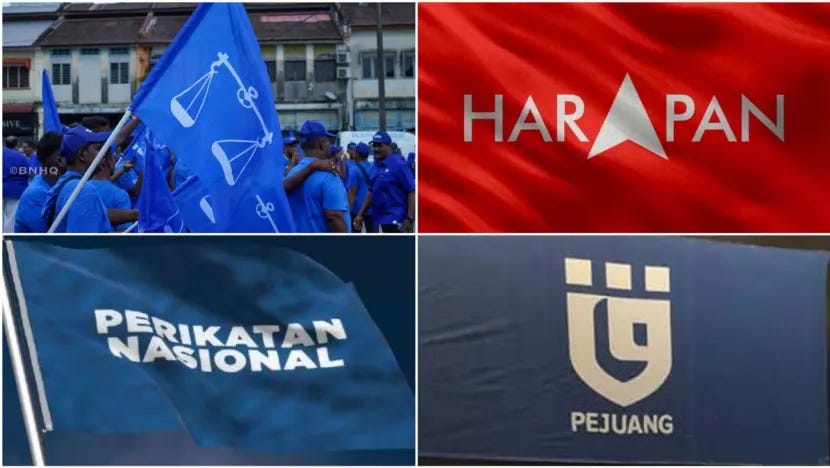With multi-cornered fights everywhere, the result will be hard to predict
The morning of nomination day
With unprecedented multi-cornered electoral fights across the country after nomination day, the final result is going to be much harder to predict. Even with the assistance of polling data (Merdeka Centre released one a day or so agao), the First-past-the-post system of voting where the candidate with the most votes is declared the winner, means that some can be elected with only 30 percent of the aggregate vote. This will mean there will be a number of surprise results on election night.
Based upon past state electoral performance Barisan Nasional should be favourite to take out the election. However, Malay voters have a number of choices this time round where there are a number of 3 cornered fights for their vote. Other factors, such as candidate credentials, and the local issues that emerge during the campaign could swing results.
The fact is, in heading into this election campaign there are many undecided voters. Undecided voters about who they will support, and undecided about whether they will actually go and vote. Simple factors like whether it rains on election day could influence the result. Key to this election will be the ability of party candidates on the ground to actually physically get their voters to the polling booths. And, this is before any potential flood situations are taken into consideration.
A major factor in this election will be the actual issues that emerge on the hustings. Voters are tired of hearing about race, religion, and corruption. That will turn voters, particularly, the young away on polling day.
Voters are concerned about their own livelihoods. This means the cost of living, inflation, income and wages, and opportunities to earn money. Voters are waiting for candidates to tell them, what they are going to do for their security. If the election campaign gets off these issues, then expect voter turnouts to be low.
The key in this election is winning the uncommitted. Their will be little point using resources preaching about threats to Malay unity and Islam to the converted. Just as it will be useless to preach about corruption to the converted within the urban areas.
The uncommitted voters are looking for help. There is no point in talking to the youth, unless you are going to help them. Youth issues will be important if candidates want them to break out of the voting habits of their parents.
Multi-cornered fights to some extend can be an equalizer for party strategists. Very skilled strategists who can look at the various segments of their electorates and understand how voters are thinking, may be able to garner hundreds of extra votes, which may be enough to snatch a victory where there is a wide split in votes.
No more this will be seen in seats like Batu, where there are expected to be 10 candidates. The campaigners who can identify pockets of undecided voters will have a great advantage.
All this means that the aggregate seats which we call the Malay heartland, may have to be shared by UMNO and to a lessor extent, the other Malay-centric parties. One of the major factors UMNO campaigns will face is sabotage by disgruntled groups, formally associated with the party. This will show out in the Arau campaign where Shahidan Kassim is expected to run against the UMNO nominated candidate. The dynamics here are unpredictable. Will voters be loyal to UMNO, or Shahidan? Could PAS reign out supreme in the context, with voters fed up with UMNO infighting? These are some of the local factors we need to look closely at, across these 90 seats.
UMNO disarray could become a major factor in the campaign. Rogue candidates discarded by Zahid could do some damage. The many illogical decisions made by Pakatan leadership will not help. For example, the PH safe seat of Sungai Buloh is now in-play for BN to take. A KJ win here could make him a potential PM compromise candidate. This could cost the two groupings dearly, giving other groups a better chance.
Bersatu, Gerakan, PBS, and Pejuang may become spoilers more than winners in GE15.
In the urban areas, its different. DAP and PKR need to hold on. Most DAP seats have very high winning margins, so any swing against them won’t make much difference. However, PKR will be vulnerable with alternative choices. This is going to be a tough election for PKR.
Sabah is going to be tough fight. Politics within Sabah appears to be strong influenced by personality, than the rest of the country. Perhaps the most predictable state is Sarawak, where GPS should make strong gains this time round.
The most likely result will be that no one grouping will be able to form government in their own right, so will have to negotiate with other party groupings. Most probably Barisan Nasional will be the largest grouping and call the shots in any negotiations. They can go either the PN or the Pakatan Harapan way in negotiating a new government. A BN-PN government would be more of the same Malay-centred government. While a BN-PH, or even BN-DAP government would be much more moderate.
Probably very likely will be a BN-GPS-Umno Sabah government. The only issue here is who would be prime minister. This could still cause a great rift within UMNO, although less likely now that the Zahid group are now much stronger within the Dewan Rakyat.
After all the swipes go on today about who betrayed their parties, the campaign will begin in earnest.
Subscribe Below:




